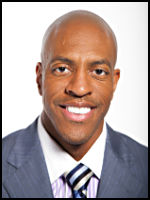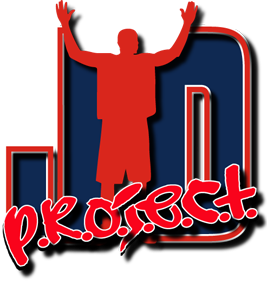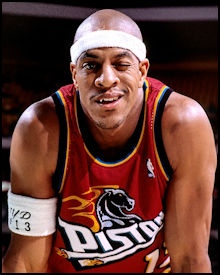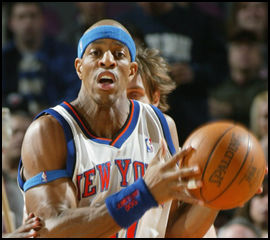Former NBA Player and Community Activist, Jerome Williams

Jerome "JYD" Williams is considered one of the greatest role players to ever play for the NBA. In 2000, Jerome led the league in high rebounding percentages and was ranked 3rd overall in offensive rating. He also collected three NBA Community Awards throughout his nine year career.
In aspiring to grow both personally and professionally, Jerome paid his own tuition to attend a local junior college that led him to acquire an A.A. degree in Business Administration. He also earned a Student Athlete Award and a full athletic scholarship to continue his education at Georgetown University. As life seemed to come full circle for Jerome, he set his goals on graduation and positioning himself for a corporate role in the Washington, DC workplace. During his final two years of college, he played basketball on national television, served as team spokesman, was selected to play on the USA Basketball college team, and interned with Arthur Anderson accounting firm and graduated on the Dean's List.
Unlike many athletes, Jerome was drafted in the 1st round of the NBA and continued his career in cities like Detroit, Toronto, Chicago and New York. During his career, Jerome thrived in various roles such as starter, rebounder, cheerleader, community advocate and NBA Players Union representative. In 2000, Jerome was selected by other NBA players to serve in an executive role as their Union Vice President. During the NBA off-season, Jerome strategically positioned himself to have an influential role within the NBA. Jerome made strategic and calculated decisions that would allow him the opportunity to have "inside look" at the many components that make-up the NBA's multi-billion dollar organization—such as being one of the only active players to intern at the NBA offices.
Jerome cultivated a starring role as Ambassador for NBA Cares, an NBA TV correspondent, NBA Fit spokesman and the NBA Goodwill Ambassador to South Africa, Israel, South America, Shanghai, Philippines, Beijing and Bahrain. Jerome's community efforts gained him national media exposure, numerous community service awards and two special invitations to dine at the White House during the George W. Bush administration. He also joined the NBA's "Basketball Without Borders" Program, an effort to teach the game and bring resources to underdeveloped nations in Africa, Asia and elsewhere. For Jerome's efforts to prepare high school seniors and college students with life skills for independent living; the Fannie Mae Foundation honored him by presenting him with their National "Home Team" Award. He also rang the stock bell at both the New York and Toronto Stock Exchanges.
Now retired, Jerome remains busier than ever running both an automotive publication (Urban Auto) and a very much needed children's charity--the JYD P.R.O.J.E.C.T.-- and its mission is to "unify people of all nationalities in a collective effort to save our kids." His passion for both cars and motivating people has spawned the theme, "preparing children along the road to the workplace". In 2007, he was invited to the White House by President George W. Bush. In 2009, Jerome served as a Nevada State Democratic Delegate for President Barack Obama.
Aside from being one of the hardest working men in philanthropy, Jerome became certified to operate a semi-truck, received GM Certification from Sports Management Worldwide which allows him to manage an NBA team, speak professionally--both internationally and domestically--all while maintaining his most enjoyable role as husband and dad.
Jerome Williams resides in Las Vegas, Nevada with his wife Nikkolette and their children - Sherae, Gabby, Giselle and Jeremiah. He is available to consult and speak/train at corporate conferences, staff trainings, university lectures, NCAA team building workshops and NBA player transition coaching.
The most inspiring thing to me about Jerome Williams is that his accomplishments do not seem to be the result of someone who has been drive by ego, rather his accomplishments seem to emerge out of a sense of purpose and out of a desire to make a real difference in the lives of young people. His life is a series of successes born out of humble beginnings and fueled by raw determination. With or without the applause, in or out of the spotlight, his legacy will no doubt endure.
DR: Tell me about the JYD Project.
JW: I was actually nicknamed "The Junk Yard Dog" by some of my teammates when I was playing for The Detroit Pistons. They started calling me "JYD" for short.
DR: Why did they start calling you "The Junk Yard Dog"?
JW: Well they started calling me "The Junk Yard Dog" because of the hard work ethic that I demonstrated while playing for the team. I was also willing to do a lot of the garbage work that didn't get any of the accolades in the papers such as rebounding, playing defense, setting good strings – just the basic fundamentals of basketball that are not to celebrated. I was just somebody who was willing to get in there and do the work.
The JYD Project
Junk Yard Dog
Established in 2009 by NBA player Jerome "JYD" Williams, The JYD Project was formed to provide youth with an exciting and effective alternative youth development program. Incorporating "a touch of urban flavor" Junk Yard Dog is able to attract and engage youth on their level using culturally relevant learning methodologies and age-specific activities. These practices allow youth to learn new skills and knowledge at a pace, style and format easily adaptable to their everyday life, increasing self-efficacy and measurable outcomes.
Teen pregnancy, drug abuse, and the high school dropout epidemic disproportionately affects disenfranchised youth from impoverished socioeconomic communities at an alarming rate.
Click here to visit the website and learn more about The JYD Project.
DR: Where did that work ethic come from?
JW: My work ethic came from my parents.
I was raised in a household with both my parents, one older brother and one younger brother. We were constantly learning about working hard. My parents worked two or three jobs at a time to keep us in the middle class. We just learned that you have to go the extra mile because the status quo usually isn't a lot.
DR: So obviously that work ethic and the way that your parents raised you was something that heavily influenced The JYD Project.
JW: Oh absolutely. My parents strongly influenced the project. Growing up, just when I would see us start to get ahead, my parents would reach out to help someone less fortunate, whether they be a family member or a friend, my parents really didn't care. All they cared about was helping other people and showing them that they cared.
As a kid, I watched my parents struggling to pay bills but at the same time they were helping other people. That was just part of the deal. Not only were they willing to struggle, they were willing to help others while they struggled.
DR: Wow. That is such a key part of living well – caring about what happens to others and being someone who is willing to help out.
Will you tell me about how the JYD Project got started?
JW: As a player in the NBA, I began my rookie year looking in the community for ways to contribute. My first project was an after school program in the Brewster community in Detroit, right in the middle of the projects. We chose that area because no other member of the Detroit Pistons had ever gone to that area to do an after school program or a basketball camp for the kids to keep them engaged in school.
My older brother Johnny came to Detroit with me when I got drafted and we read an article in the Detroit papers that said 33% of the kids in Detroit were dropping out of school. That's why we began to try and come up with solutions to try and address the problem. That was the first program.
That program grew into different areas such as financial literacy, obesity and health issues and other areas that would help the community. It was all labeled The JYD Project at first. We wanted to bring awareness and support to these issues. That's how the project got started.
Jerome Williams while playing for the Detroit Pistons
DR: Tell me about one of the successes or an experience you had with one of the kids that stands out for you?
JW: Oh sure. Early on, I guess back in 1997 when we won The Fannie Mae Home Team Award in Detroit for our Financial Literacy program, our goal was to speak to the entire senior class of the Detroit Public School System. I couldn't have done that without my older brother Johnny. He really spearheaded the program and got all the schools involved. We were able to accomplish our goal through the project.
Upon completing it, about four years later we started receiving letters. One letter we got was from a young man in the program who was not on track to graduate from high school. He ended up graduating from high school and then he went college and graduated from college. He said that he would have never gone that far or even graduated from high school had we not come down and done the program. I thought "Wow". If you can get just one letter like that in your lifetime then you will know that you made a huge difference in society. We made an impact on this young man's life and he is someone that we were able to put back into society as opposed to someone who would be taken out.
You hear far too many times that NBA players are not role models or that they don't care or all they care about is the money and I know that that is not true because I have played with a lot of players who do work similar to what I do. They care and give back in different ways.
DR: As I consider the state of our educational system, especially lately, I get sad because it is clearly an institution that is deteriorating and it doesn't seem to be a national priority in terms of looking at what it will take to authentically serve kids instead of just making empty gestures. As someone who works directly with kids, and I am assuming that there is an overlap with schools and school systems, what would you tell someone in a position to make a change, whether it's a law maker or a school superintendent or a princpal, what would you tell that person that would influence them to make a difference for kids?
JW: Research shows that youth today are disengaged in our educational system. Technology plays a huge role in that. I feel like technology has to be used in order to re-engage kids that are disengaged.
There are several factors that contribute to statistics:
- Cultural disconnect – ethnic and socio economic
- Teachers failing to acknowledge learning style differences
- Passing kids through there system who have not maintained their grades
- Problems at home
These things are impacting our kids tremendously and there is not enough attention brought to these challenges. Often our educational systems focus mainly on the test scores...
DR: Yes. Oh God, yes...
JW: ...and they are not looking at these other dynamics within a child's life and within the child's eco-system that make up the environment for non-development. These things need to be addressed in order for kids to succeed.
Jerome Williams while playing for New York
DR: What do you have going on right now at JYD? What's bubbling right now?
JW: What's bubbling right now is a brand new player development program.
I have always loved all types of youth motivation initiatives and keeping kids in school and I focus a lot of my energy on that. The Player Development Program came about because I'm 40 years old and I feel like you have to look and see that there is an end to what you will be able to accomplish and I wanted to start to recruit some new talent that would be able to carry on. I really wanted to focus on helping young players develop life skills and an awareness of their brand and their ultimate goal of making money at a sport that they love.
That is where the Player Development Program was birthed. Based on what I know, my career, the things that I have seen and the mistakes that I have made, I looked at how I could influence the next generation of professional athletes.
I have programs for athletes in high school, college and the pros. We are most effective at the high school level because the older people get the harder they are to reach or de-program the foundation that has already been laid.
DR: My husband played high school and college basketball and he is very passionate about it. He played at Power Memorial and he's got all this Power Memorial pride and everything and I know important basketball was to him as high school student. So, I can easily imagine that if you can get kids that are engaged, and it's no secret that a lot of inner-city kids are inspired and motivated by athletics, than you can change their path in life for the better. What I like about your program is that you are able to parlay that passion and enthusiasm into new possibilities and avenues for success for them, yes?
JW: Yes. Absolutely. There is so much money involved in basketball and so many kids see basketball or athletics as the only way.
I went to both public and private schools. I know the challenges of both. I know the deficiencies that I had when I arrived on a Junior College campus where I had to take certain other courses before I could take actual college courses. I try to emphasize in my program the things that kids need to know and the things that will help them be successful in life. Our motto is "Success is winning on and off the court". Skills will take you wherever God allows but life lessons will help you when you are off the court. A lot of NBA players don't realize the importance of an education and how that will help them navigate life in the NBA and how that will help them make better decisions that will impact them for decades after they have played.
DR: What will need to happen for you to feel like the program is was successful?
JW: I have been doing the program for about 4 years now and one of the players that started in the program when I was in the developmental stages is an NBA player that played for Cleveland Cavaliers by the name of Christian Thompson and another player by the name of Cory Joseph. These two young men were like sponges when it came to me talking to them about life as a professional athlete. Now they are in their second year in the NBA. They only went to college for one year before being drafted. I had two years with them in high school and I realize that they didn't spend a lot of time in college to develop the skills that will help them succeed in life so I realize that I had an impact. They are still in development.
Christian Thompson was the fourth pick in the draft making upwards of $5 million a year as a 19 year old and he was able to make wise decisions. The first one was in buying his house. Instead of buying a multi-million dollar spread, which is the norm, he's renting a house for a modest price and that is not the norm. A kid that is expected to make around $25 million to $50 million usually can expect to spend $3 to $5 million in his first five years on just houses alone. Whereas Christian, if he continues on this path, will spend about $160,000 in rent. That to me is a huge win because I know the impact of him being able to spend that money. He is saving and not foolishly spending. His ultimate goal will be to be able to live on the interest of his savings when he is no longer able to play. That is one of the things I emphasize in the program. The more you can save, the more you will have when you are no longer able to play.
There are just a lot of different things that I just love about doing this. I have lived it! Kids are still fascinated by my Junk Yard Dog persona. I had a lot of firsts in the NBA. I was the first role player with his own tennis shoe. I was the first player with his own mascot. I was the first role player with a Sprite deal. All of these firsts in my life - I am able to break down for, not only high school players, but also for the pro player because the majority of the league are journeymen at best. They are not the franchise players such as Kobe and Lebron. They are not those guys. They are guys who are very talented but they are the masses. They are replaceable. So how do you create that brand that NBA franchise covet and look for? It starts with everything that you do and say. It all makes a difference.
DR: A hundred years from now what do you want to be remembered for?
JW: I want to be remembered for being a player who maximized my talent on and off the court to produce the next generation of players' success stories.
If I could be remembered for doing that, I would be looking down from heaven smiling thinking, "Yes! I'm glad I didn't take those easy roads. Instead, I did the right thing."
Thanks Jerome!



